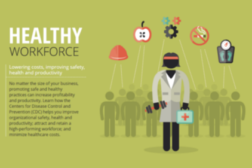Home » Keywords: » presenteeism
Items Tagged with 'presenteeism'
ARTICLES
Training
Preventative training is essential when there is risk of workplace injury
Read More
2014’s most absurd excuses for calling in sick
CareerBuilder says percentage of workers calling in sick when they’re not is up
October 20, 2015
Rheumatoid arthritis carries high costs for employers
National costs for RA absenteeism exceed $250 million per year
June 16, 2015
When health risks go down, worker productivity goes up
Study: Lasting health improvements lead to cumulative productivity gains
April 13, 2015
Become a Leader in Safety Culture
Build your knowledge with ISHN, covering key safety, health and industrial hygiene news, products, and trends.
JOIN TODAYCopyright ©2025. All Rights Reserved BNP Media.
Design, CMS, Hosting & Web Development :: ePublishing







